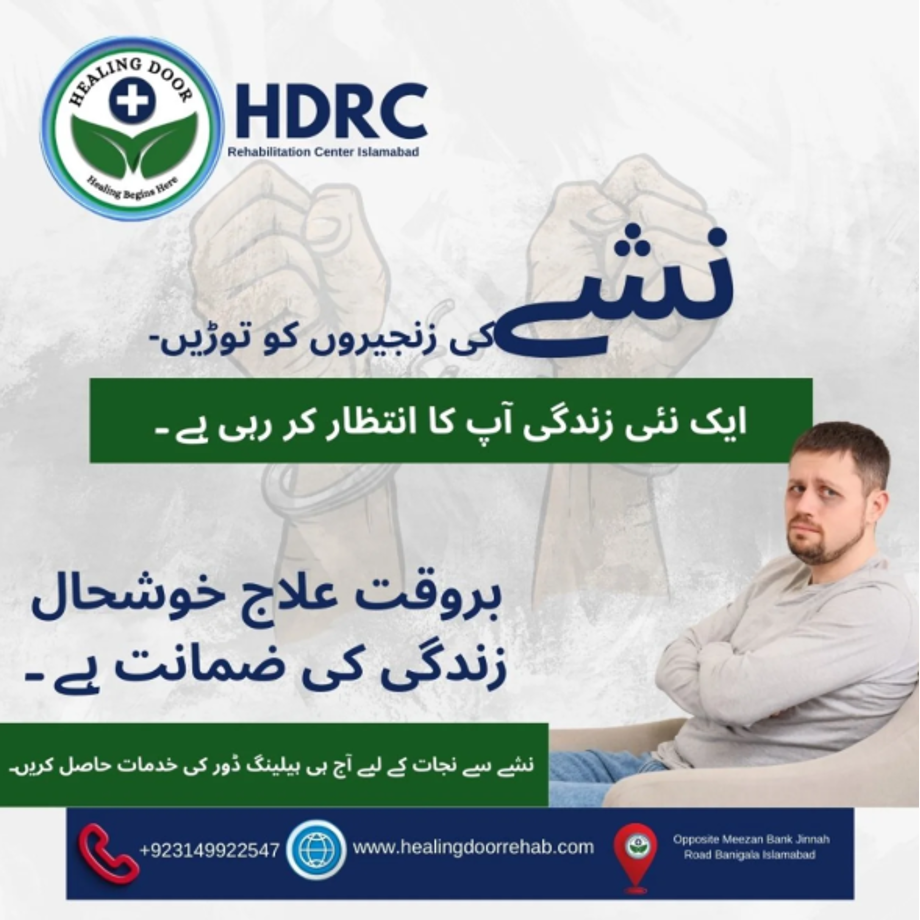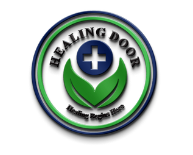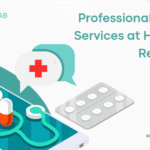Drug Addiction Treatment Pakistan: A New Era of Recovery

Drug addiction has become one of the most burning issues in Pakistan, regarding, in the last several decades. The secret that used to be discussed in the closed rooms is now an open crisis that hurts both the urban and rural populations. School going youngsters to employed adults, substance abuse has its tentacles waving over the demographic lines. However, there is hope despite the problems. Revolution is in the air, but it is a silent revolution in the making: drug addiction treatment Pakistan is changing, not only philosophically, but also in practise as well.
A mix of increased societal contextual awareness, the better quality of medical infrastructure, professional re hab centers such as Healing Door Rehab Center and a shift in focus away of less rehabilitation to punishment have helped form this evolution. Modern therapy opportunities have become much more advanced and humane as compared to the past that was the situation ten or so years ago. Here are the ways and reasons behind this transformation, and what it implies to individuals and families who are trying to find recovery.
The Historical Context of Drug Addiction in Pakistan
The fight against substance abuse in Pakistan is a long struggle. Over the years, the country has been used as a point of entry and transit by drug traders as heroin, cannabis, opium, and most recently methamphetamine (ice) are imported and circulated within the country because of its geographic location of being a smuggling point. Addiction first spread in its border regions but later in big cities such as Karachi, Lahore and Islamabad where millions became addicts.
Previously the treatment opportunities were limited. The drug addicts were mostly seen as criminals and the immediate reaction was imprisonment or abandonment. Rehabilitation centers were stigmatized, under-resourced and even abusive, particularly the government-funded ones. There were also private rehabs, which were poorly managed or even uncontrolled.
But this situation is no longer the case. There has been a tidal change in Pakistan with medical professionals, NGOs, mental health activists and state-of-art rehab centers, such as Healing Door, rendering sustainable science-based recovery to more individuals than ever previously.
The Role of Societal Awareness and Education
Among the greatest driving forces towards change in drug addiction treatment Pakistan is the growing awareness towards drug addiction as mental disorder by the people, rather than a defect. With the help of the non-profits, journalists, social media influencers, and progressive medical workers, the Pakistani citizens are getting used to viewing the problem through a more understanding light.
Campaigns to inform young people about the danger of drugs, the necessity of addressing the problem early, and eliminating the stigma against treatment have also made families become aware of the warning signs. This enlightenment has been the step towards changing the society- where treatment is no longer subject to humiliation, but an optimism.
This transformation in thinking is important. With individuals feeling secure and safe to seek aid, early intervention is achievable, which considerably affects the results of treatment.
The Emergence of Professional, Patient-Centered Rehab Facilities
Although the policy of the government contributed to the transformation of drug treatment practices, one of the primary factors was the emergence of such rehabilitation centers that run their activity in a very professional and transparent manner. The Healing Door Rehab Center in Islamabad is the most prominent among them since it is one of the first to provide evidence-based and holistic care based on the needs of the contemporary patients.
In comparison with obsolete facilities operated by confinement or detox only, Healing Door offers a comprehensive model of full-spectrum treatment covering the following areas:
- Medical supervision by having a physical detoxification
- Counseling or therapy to deal with anxiety, depression, PTSD and trauma
- One to one and group counseling
- Planning of relapse prevention
- Physical, spiritual, and emotional health
Healing Door is able to restore a sense of purpose and identity to the patients by treating the individual rather than only the problem, a process that makes long-term recovery much more possible.
Integration of Holistic Therapies
The other factor that makes drug addiction treatment in Pakistan increasingly effective is the incorporation of holistic treatment that extends beyond treatment with detox and medication. Patients with access to centers such as Healing Door are able to access:
- Sessions of mindfulness and meditation
- Physical fitness and yoga exercises
- Health nutrition counseling
- Art and music therapy
- Spiritual healing system according to cultural and religious values
It is through this approach that addiction is known to impact the body, mind, and the spirit. Hence, the healing should take place in three levels. The solution to this is through holistic approaches that do not only decrease stress and cravings, but also foster emotional resilience, the most significant relapse defense.
Gender-Sensitive and Youth-Focused Programs
Addicted women in the traditional Pakistani society tend to live in their misery. They have been deterred by cultural stigma, safety issues and lack of privacy to venture into rehab centers. This is however changing fortunately.
Female-only treatment programs feature modern centers such as Healing Door, which offers women a safe, confidential, and supportive environment based on the individual needs of women on the psychological, emotional, and physical levels. These programs are run with women counselors and medical workers who are aware of the gender dimensions of addiction including domestic abuse, trauma, or postpartum depression.
On the same note, youth oriented programs have risen to fame owing to the alarming nature of drug use among school and college going children. Healing Door would provide educational services, peer counseling and skill development activities to adolescents and young adults to integrate them into society and be confident.
Importance of Family Involvement
The family-centered culture of Pakistan makes it impossible to have any recovery process without the family. It is on this understanding that maturing treatment facilities are including family sessions, psychoeducation, and even frequent counseling of spouses, parents, and siblings. Healing Door stresses on expanding the teaching of families:
- The impact of addiction to behavior and decision-making
- The method of healthy limits
- What to do to assist a loved one who is undergoing healing without promoting the negative behavior pattern
The higher the amount of information and involvement to the families, the more the probability of long-term success grows exponentially. When a patient is going back into a home setting that is supportive and understanding, he has a high chance of remaining clean.
Use of Technology and Digital Support
Technology has been very instrumental in the fight against drug addiction in Pakistan as well. The use of telemedicine, mobile health applications, as well as virtual therapy platforms is granting accessibility to the far-flung people more professional assistance.
Healing Door provides the virtual consultation, post-discharge teletherapy and online recovery modules that enables patients to maintain the required pace and attitude even after being discharged from the center. This keeps care continuous and this is one of the most significant elements of relapse prevention.
Also, the adoption of electronic health records (EHRs) and progress recording systems will enable medical service providers to track the state of health of patients and modify the treatment plans accordingly. Only a few years ago, such data-driven care did not even exist in theory.
The Financial Side: Accessibility and Affordability
Although most people feel that cost is a hindrance to commencing treatment of drug addiction in Pakistan, there is growing effort to make it cheaper. An example is Healing Door which provides packages of treatment based on individual needs, duration of stay or financial ability to pay.
Patients, in certain instances, are given payment on installments or discounted rates. The NGOs, charity trusts are also coming to the rescue to sponsor the treatment of those patients who belong to less privileged communities.
Even though there are no intentions to cover comprehensive mental health and addictions services with health insurance in Pakistan to this day, the private providers promote change and some progress is observed in that direction.
Long-Term Recovery and Reintegration Programs
The post-rehab support was one of the gaps that existed heavily back in the day. Patients will be sent back to their former surroundings with no tools or methods to handle it and frequently this would result in relapse. Currently, leading facilities such as Healing Door have spent a lot of money on aftercare programs, which consist of:
- Preparation of relapse prevention
- Career counseling
- Further treatment (through internet or face-to-face)
- States of aggression – Peer support groups
- Skill-developing and vocational training
Such programs aid the patients to create a life that it is worth cleaning up. Recovery is not once anymore but a longtime process that needs order, society, and meaning.
Stories of Transformation
There is the story behind each statistic. Young professionals who have survived the ordeal of addiction to pills, mothers who have finally gotten over decades of alcohol dependency, these are some of the real lives that are being made, with these modern day rehabilitation procedures.
One of the former patients of Healing Door explained his experience: I came broken, also ashamed, and hopeless attitude when I came in. I went away with my head raised up in the air, with means to remain dry and with a team who believed in me. It has helped me to save my life.”
One of the other clients said: The female exclusive program provided me with the secure healing environment. I had never visited other centers, but this became the first one to know what I wanted as a trauma healing woman.”
These testimonies are gaining in popularity and, broader still, the society and professionals are changing their way of looking at the procedure of healing addiction.
A Future Rooted in Compassion and Science
Evolution of drug addiction treatment Pakistan is not simply a change of health care system- it is a paradigm shift of hearts, thoughts as well as systems. Punitive obsolete ancient models are being replaced by the new vision of recovery, which is based on compassion, clinical excellence, and the restoration of dignity, the holistic approach to care.
Organizations such as Healing Door Rehab Center are at the fore of this change. Their ability to provide globally renowned treatment that can be applied in a local context proves that not only is it viable to recover, but it can be maintained as well. Individuals who struggle with addiction and families with questions now have hope in this new era. Not that kind of false hope founded on unquantifiable hopes, but quantifiable, hope of a different life, a hope supported by the science, craft and affection.
It is possible that addiction could remain to be a leviathan in Pakistan, however, the weapons to battle it are not available alone anymore and what is more, they are effective.



